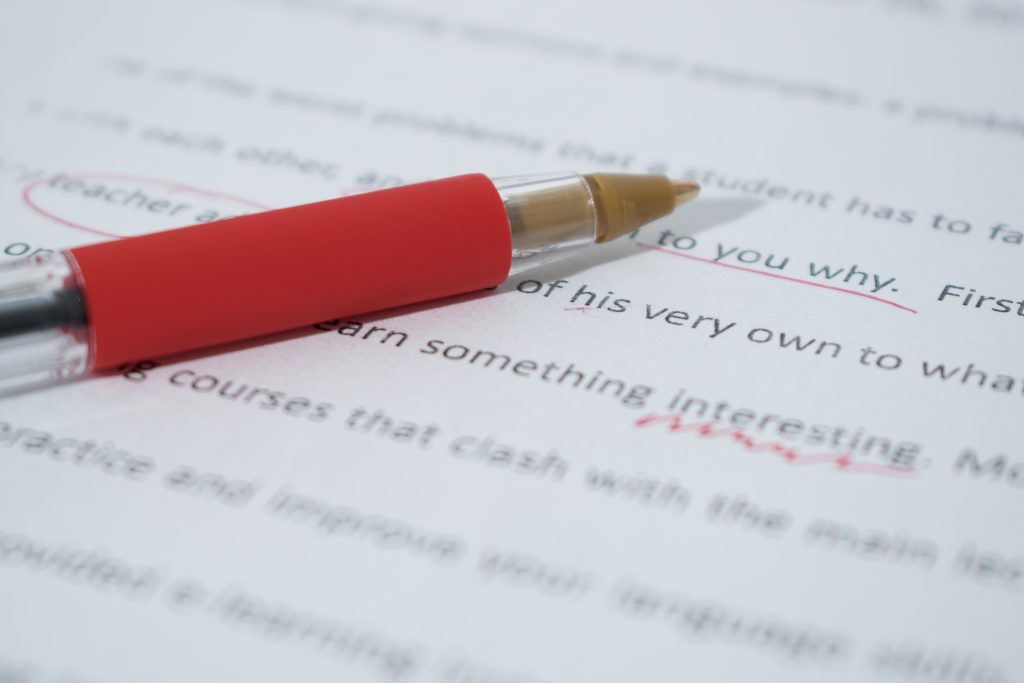Welcome to The Myths and Realities of Editors and Editing by Miriam Ruff – Part Two
Last time, we talked about a number of myths that surround manuscript and book editors and editing, and what exactly these people do. Here we’re going to tackle some additional myths regarding the editing profession and expose the realities every writer and would-be editor need to know.

You may not think you need an editor
Myth 1: A good writer doesn’t need an editor.
Absolutely not true! In fact, it’s often the case that the most gifted writers need editors the most. Why? When you write, you come to live in the world you’ve created. You know your characters intimately. You know the arcs they’re going to take, the hesitations at each decision, and the way the world works around them. As a result, you become so involved that you “can’t see the forest for the trees.” You’re so close to everything that you see exactly what you expect to see, not what actually made it on to the page.
A chapter you feel is absolutely vital to your story may actually be an unnecessary tangent, and your book will be more focused and taut if you delete it. An editor, who has no preconceived ideas about what you’ve written, will be able to point this out to you, as well as tell you where the story or characters need shoring up, where more detail would be helpful to the reader, or where you’ve introduced inconsistencies. Even the “greats” like Stephen King, Isaac Asimov, or Neil Gaiman have editors to help them finely tune their stories so they’re the best they can be.
Myth 2: Your writing will become a “copycat” of other, successful books.
This myth comes into play whether you’re working with a big publishing house or are self-publishing. With a big publisher, the fear is that the editor will try to make it more generic or mainstream, so it will appeal to a larger audience. The reality is that editors want the best manuscripts they can get and then nurture them until they’re birthed into bookstores around the world. Yes, they may make some parts of your book more conventional in the interest of understandability, but no editor wants all books to sound the same – that’s boring, both to them and to the ultimate readership. They actually want unique, strong voices and writers who will become “the next great thing.” If your book reads like everything else, you’re just going to get lost in the crowd.

Good editors don’t edit to validate themselves
Myth 3: Editors change things just to justify their jobs.
No good editor will change something just because. Working with an editor should be a dialogue, a back-and-forth communication with the objective to make the best piece of writing possible. If an editor suggests a change, she has a good reason for doing so. If you don’t understand the rationale behind it, don’t just get mad or reject it outright – ask! There’s nothing that says you have to keep the change, but you should at least be equipped to know if such a change is really justified and you couldn’t see the problem because you were too close to the work. Editors don’t want to make busywork for themselves – they have too much to do and too many manuscripts to get through in a short period of time. Speak up, and you may find you learn something valuable in the process.
Myth 4: Anyone can edit a book.
This myth is particularly pervasive with the self-publishing authors who may be working on a next-to-nothing budget and don’t want to spend lots of money on a professional editor. Instead, they ask a friend or family member to do the edit, especially if that person knows something about grammar or has a degree in English, thinking that will be sufficient. It is most definitely not.
The way to see the fallacy in this reasoning is to ask yourself a question: Can just anyone write a book, one that is high quality, intriguing, and a definite page turner? No. It takes years of practice, workshopping, more practice, and a lot of trial and error. The same is true for editing. Book editing is a skill, one acquired over time with a lot of practice. The best editors learn how to work with – not against – writers, pointing out errors, suggesting fixes, and dishing out advice on all aspects of the writing and publishing process. That requires specialized training and years in the business learning the ropes to become someone on whom the writer can rely. Find a way to get the money to hire a decent editor. The perks are that you’ll get a lot of lessons on how to become a better writer and a book that has a chance of doing well.

Spellcheck can trip ewe up
Myth 5: Editors are becoming obsolete.
This myth arises both from writers (especially first-time and self-publishing) and from would-be editors who rethink going in to the business. What’s the need for an editor when most word processors and writing programs have built-in spell and grammar checkers? As for the former, take a look at this popular send-up of spell checkers:
Eye halve a knew spell checker;
It came with my pea sea.
It plainly marks four my revue,
Miss steaks eye kin knot sea.
Every single word in this poem is an actual word, so your spell checker would not catch any “mistakes.” Yet, clearly, the whole thing does not make sense. It takes an actual human being looking at the text to make the necessary corrections for clarity and comprehension,
As for the latter, take a look at the following sentence:
“I went too go to the storage.”
If you’re using Microsoft Word, its grammar checker will tell you that this is a perfectly acceptable sentence, regardless of the fact that it contains multiple incorrect word choices and makes no sense. Did you get that it was supposed to say “I wanted to go to the store.”? Most people would not. Once again, an actual editor needs to look at the manuscript to ensure mistakes like this do not go undetected. Editing is a vital part of the writing process, and it should be looked upon as an opportunity, not as a burden.
Do you know of any editing myths that we haven’t covered and think we should? Please leave us your comments in the section below.
What do you think? Do you agree? Disagree? Please add your comments in the section below.
– Miriam Ruff, Content Creator, PoetsIN
Please follow and like us:
Welcome to The Myths and Realities of Editors and Editing by Miriam Ruff – Part Two
Last time, we talked about a number of myths that surround manuscript and book editors and editing, and what exactly these people do. Here we’re going to tackle some additional myths regarding the editing profession and expose the realities every writer and would-be editor need to know.
You may not think you need an editor
Myth 1: A good writer doesn’t need an editor.
Absolutely not true! In fact, it’s often the case that the most gifted writers need editors the most. Why? When you write, you come to live in the world you’ve created. You know your characters intimately. You know the arcs they’re going to take, the hesitations at each decision, and the way the world works around them. As a result, you become so involved that you “can’t see the forest for the trees.” You’re so close to everything that you see exactly what you expect to see, not what actually made it on to the page.
A chapter you feel is absolutely vital to your story may actually be an unnecessary tangent, and your book will be more focused and taut if you delete it. An editor, who has no preconceived ideas about what you’ve written, will be able to point this out to you, as well as tell you where the story or characters need shoring up, where more detail would be helpful to the reader, or where you’ve introduced inconsistencies. Even the “greats” like Stephen King, Isaac Asimov, or Neil Gaiman have editors to help them finely tune their stories so they’re the best they can be.
Myth 2: Your writing will become a “copycat” of other, successful books.
This myth comes into play whether you’re working with a big publishing house or are self-publishing. With a big publisher, the fear is that the editor will try to make it more generic or mainstream, so it will appeal to a larger audience. The reality is that editors want the best manuscripts they can get and then nurture them until they’re birthed into bookstores around the world. Yes, they may make some parts of your book more conventional in the interest of understandability, but no editor wants all books to sound the same – that’s boring, both to them and to the ultimate readership. They actually want unique, strong voices and writers who will become “the next great thing.” If your book reads like everything else, you’re just going to get lost in the crowd.
Good editors don’t edit to validate themselves
Myth 3: Editors change things just to justify their jobs.
No good editor will change something just because. Working with an editor should be a dialogue, a back-and-forth communication with the objective to make the best piece of writing possible. If an editor suggests a change, she has a good reason for doing so. If you don’t understand the rationale behind it, don’t just get mad or reject it outright – ask! There’s nothing that says you have to keep the change, but you should at least be equipped to know if such a change is really justified and you couldn’t see the problem because you were too close to the work. Editors don’t want to make busywork for themselves – they have too much to do and too many manuscripts to get through in a short period of time. Speak up, and you may find you learn something valuable in the process.
Myth 4: Anyone can edit a book.
This myth is particularly pervasive with the self-publishing authors who may be working on a next-to-nothing budget and don’t want to spend lots of money on a professional editor. Instead, they ask a friend or family member to do the edit, especially if that person knows something about grammar or has a degree in English, thinking that will be sufficient. It is most definitely not.
The way to see the fallacy in this reasoning is to ask yourself a question: Can just anyone write a book, one that is high quality, intriguing, and a definite page turner? No. It takes years of practice, workshopping, more practice, and a lot of trial and error. The same is true for editing. Book editing is a skill, one acquired over time with a lot of practice. The best editors learn how to work with – not against – writers, pointing out errors, suggesting fixes, and dishing out advice on all aspects of the writing and publishing process. That requires specialized training and years in the business learning the ropes to become someone on whom the writer can rely. Find a way to get the money to hire a decent editor. The perks are that you’ll get a lot of lessons on how to become a better writer and a book that has a chance of doing well.
Spellcheck can trip ewe up
Myth 5: Editors are becoming obsolete.
This myth arises both from writers (especially first-time and self-publishing) and from would-be editors who rethink going in to the business. What’s the need for an editor when most word processors and writing programs have built-in spell and grammar checkers? As for the former, take a look at this popular send-up of spell checkers:
Every single word in this poem is an actual word, so your spell checker would not catch any “mistakes.” Yet, clearly, the whole thing does not make sense. It takes an actual human being looking at the text to make the necessary corrections for clarity and comprehension,
As for the latter, take a look at the following sentence:
“I went too go to the storage.”
If you’re using Microsoft Word, its grammar checker will tell you that this is a perfectly acceptable sentence, regardless of the fact that it contains multiple incorrect word choices and makes no sense. Did you get that it was supposed to say “I wanted to go to the store.”? Most people would not. Once again, an actual editor needs to look at the manuscript to ensure mistakes like this do not go undetected. Editing is a vital part of the writing process, and it should be looked upon as an opportunity, not as a burden.
Do you know of any editing myths that we haven’t covered and think we should? Please leave us your comments in the section below.
What do you think? Do you agree? Disagree? Please add your comments in the section below.
– Miriam Ruff, Content Creator, PoetsIN
admin